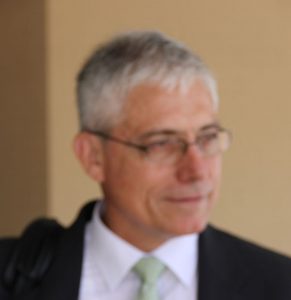Woodruff found to have violated duties of competence and diligence in another case
The U.S. District Court for the NMI’s disciplinary panel has found that disbarred lawyer Stephen C. Woodruff had violated his duties of competence and diligence in representing a client in another civil lawsuit that resulted in the dismissal and closure of the case.
The District Court panel judges imposed on Woodruff the same sanction that was imposed in his previous disciplinary matter, which is suspension from practice for one year.
The panel composed of District Court Chief Judge Ramona V. Manglona and designated judges Roberto C. Naraja and Teresa Kim-Tenorio did admit their failure to promptly tend to this case.
They first heard the disciplinary case against Woodruff on May 23, 2016. The judges, however, only issued their decision and order Tuesday.
“The court recognizes that it would be unfair to make an attorney start serving a term of discipline in late 2018 that, but for the court’s inaction, might have already ended,” the judges said.
The judges said the suspension shall run concurrently with the suspension in the previous disciplinary matter—from March 28, 2018, the date of the order modifying discipline.
They said Woodruff may continue representing clients in any open cases, which the court understands to be only the plaintiff in Ramsey vs. Muna case.
The judges said Woodruff is not permitted to enter appearances in new cases during his period of suspension.
They said Woodruff may apply for reinstatement after the expiration of at least one-half of the period of suspension.
The judges said U.S. District Court for Guam Chief Judge Frances Tydingco-Gatewood, who is the designated judge in Woodruff’s previous disciplinary case, noted that the lawyer had missed crucial deadlines in his own reciprocal discipline case and offered up weak excuses.
The judges said Tydingco-Gatewood wrote, “Respondent’s failure to attend to his own disciplinary cases mirrors the misconduct alleged in [the CNMI’s disciplinary complaint].”
The judges said they draw attention to this related conduct only to show why they do not give much credit to Woodruff’s protestations that he has a history of managing his caseload competently and diligently.
“What the panel saw in the evidence was an attorney who, for whatever reasons, was taking on more than he could handle, not just for a short period of acute stress but over the course of many years,” the judges noted.
The judges said attorney discipline in the District Court may consist of disbarment, suspension for up to five years, public censure, or private reprimand.
Were it still 2016, they would likely impose disbarment or a period of suspension starting 30 days from now, the judges said. They said much time has passed, however.
The judges acknowledged that more than two years have passed since they took the matter of the sanction issue under advisement.
“The court is mindful of the irony of judging one of its own lawyers for failure to attend promptly to his client’s matters when it has failed to promptly tend to this one,” they said.
That failure, the judge said, is a disservice to Woodruff, complainant Murugesan S. Subbaiah, and prosecuting counsel Rexford C. Kosack, who worked long hours pro bono on the case.
In the meantime, the judges said, other disciplinary cases involving Woodruff have made their way through the CNMI and federal courts.
“It is against that background that this panel must decide how best to fairly bring the matter to a conclusion,” the judges said.
On May 23, 2017, Manglona, Naraja, and Kim-Tenorio held a merits hearing in the disciplinary case involving Woodruff. Present at the hearing were Kosack and Woodruff.
The complaint for ethical violations stemmed from Woodruff’s representation of Subbaiah on appeal of a civil judgment against him to the U.S. Court of Appeals for the Ninth Circuit.
The complaint alleged that Woodruff missed the deadline for filing his client’s opening brief without having asked for more time, and failed to follow up on transcript requests with the District Court reporter.
Three months after the filing deadline had passed, appellee filed a motion to dismiss. Woodruff failed to file a response to the motion or to request an extension of time.
When the Ninth Circuit dismissed for failure to prosecute, Subbaiah himself filed a motion to reinstate the case. The Ninth Circuit denied it and gave Subbaiah 28 days to re-file it along with the opening brief.
Woodruff, who had never withdrawn from the representation, did not re-file the motion or file an opening brief. Three years later, the Circuit Clerk informed Subbaiah that the case would remain closed because of the failure to file an opening brief.
Subbaiah testified in the disciplinary case that he had paid Woodruff a total of $1,850 to pursue the appeal.
After hearing the arguments of the parties, the panel found that Kosack had proved that Woodruff had violated his duties of competence and diligence.
The panel then set a separate hearing for the penalty phase of the proceeding and invited briefs from the parties.
The panel held the sanctions hearing on June 15, 2016. After hearing the arguments of Woodruff and Kosack, the panel took the matter under advisement.
In 2013, then-Superior Court associate judge David A. Wiseman disbarred Woodruff from the practice of law in the CNMI for 44 violations of the Model Rules of Professional Conduct.
The CNMI Supreme Court affirmed the disbarment order in 2015. The District Court then issued to Woodruff a notice of intent to impose reciprocal discipline.
After Tydingco-Gatewood imposed the reciprocal discipline on March 9, 2017, Woodruff moved to modify the order.




























